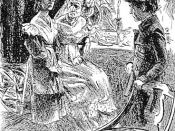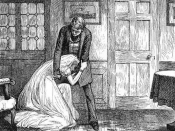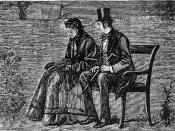Miss Havisham is the wealthy, eccentric old woman who lives in a manor called Satis House near Pip's village. She is manic and often seems insane, flitting around her house in a faded wedding dress, keeping a decaying feast on her table, and surrounding herself with clocks stopped at twenty minutes to nine. As a young woman, Miss Havisham was jilted by her fiancé minutes before her wedding, and now she has a vendetta against all men. She deliberately raises Estella to be the tool of her revenge, training her beautiful ward to break men's hearts.
Ambition and Self-Improvement - The moral theme of Great Expectations is quite simple: affection, loyalty, and conscience are more important than social advancement, wealth, and class. Dickens establishes the theme and shows Pip learning this lesson, largely by exploring ideas of ambition and self-improvement--ideas that quickly become both the thematic center of the novel and the psychological mechanism that encourages much of Pip's development.
At heart, Pip is an idealist; whenever he can conceive of something that is better than what he already has, he immediately desires to obtain the improvement. When he sees Satis House, he longs to be a wealthy gentleman; when he thinks of his moral shortcomings, he longs to be good; when he realizes that he cannot read, he longs to learn how. Pip's desire for self-improvement is the main source of the novel's title: because he believes in the possibility of advancement in life, he has "great expectations" about his future.
Ambition and self-improvement take three forms in Great Expectations--moral, social, and educational; these motivate Pip's best and his worst behavior throughout the novel. First, Pip desires moral self-improvement. He is extremely hard on himself when he acts immorally and feels powerful guilt that spurs him to act...


